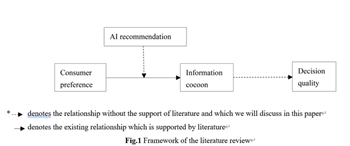Friend or foe: Do online recommender tools really improve decision making?
Published 29 November, 2021
Artificial intelligence (AI) recommender tools are widely used by industries such as e-commerce, media, banking and utilities. The tool’s algorithm uses website visitors’ past online activity and other data, both implicit and explicit, to predict what that visitor would like to view or buy next, and then presents those options to them. This can be highly beneficial; for example, for customers, the recommender can save them time by suggesting options tailored to their tastes and needs. While, for companies, it can encourage consumers to spend more via their website and increase customer loyalty: in the case of streaming giant Netflix, it’s estimated that its recommendation engine generates $1 billion annually.
A group of researchers from China, Finland and Korea set out to uncover the potential negative effects of these AI tools. As co-author Sihua Chen, from China’s Jiangxi University of Finance and Economics, explains: “Every coin has two sides, and with the penetration of AI recommenders in our lives, the downsides are becoming more apparent.” The research was first published online August 10, 2021 in the journal, Journal of Management Science and Engineering, and is scheduled to be published in print December 2021.
After reviewing previous research on the topic, the team built an empirical model, which reveals how a customer’s preferences influences their purchase decisions, and the role that AI recommendation plays in that process. They were particularly interested in exploring the internet ‘information cocoon’ phenomenon: when facing a large volume of information online, people tend to see only what they want to see.
The researchers conducted two experiments using Jingdong and Taobao, the two biggest online shopping platforms in China. According to author Jian Mou, of Korea’s Pusan National University, “we found that AI recommendation augmented the information cocoon effect. In other words, people see what they want to see, and then the website’s AI recommender algorithm selects content for them based on those preferences. This negatively impacts the quality of the customer’s purchasing decisions.”
Co-author Mikko Siponen, of Finland’s University of Jyvaskyla, adds: “As with many other new technologies, AI recommendation is a source of unintended consequences. Our findings have important implications for consumers, particularly in the e-commerce industry – if they want to take independent purchasing decisions, they need to avoid the overwhelming influence of AI recommender tools.”

###
Contact the corresponding author: Wei He, hewei@jxufe.edu.cn